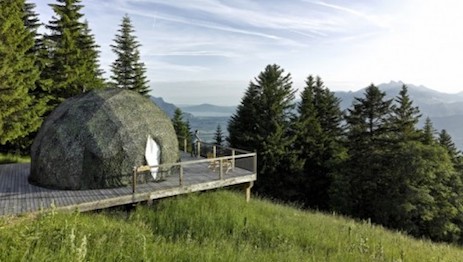- About
- Subscribe Now
- New York,
April 24, 2018

 Sustainability is an important part of travel. Image credit: Booking.com.
Sustainability is an important part of travel. Image credit: Booking.com.
As sustainability in the travel industry becomes vital moving forward, some consumers still need to be convinced that luxury offerings can keep up their standards in an environmentally friendly fashion.
According to a study by Booking.com, about 19 percent of survey takers believe that eco-friendly travel lacks the luxury and comfort level they are looking for. The Sustainable Travel Report shows that 78 percent of U.S. travelers are interested in eco-conscious travel, but 43 percent have revealed they never manage to take sustainable trips.
"As travelers increasingly look to explore and experience the world in a sustainable way, we continue to look at ways that we can help make it even easier for them to do that, whether by highlighting eco-friendly properties or enabling people to filter their search results on Booking.com based on proximity to an electric vehicle charging station," says Pepijn Rijvers, senior vice president officer and chief marketing officer at Booking.com.
Sustaining the environment
The interest in sustainable travel is there, and growing, but the problem for travelers is how to implement it.
About 35 percent of U.S. consumers say they do manage to travel in an eco-friendly manner, but this term is subjective.
Twenty-eight percent of consumers are interested in sustainable travel to save the environment, making it the top reason for eco-friendly travel. Environmental concerns are followed closely behind with travelers wanting a culturally relevant experience and wanting to feel good about their travel choices, at 25 and 26 percent, respectively.
Eco-friendly resorts. Image credit: El Nido Resorts
Tourists are often inspired by their experiences while on trips to travel in a more environmentally friendly way. Fifty-five percent claimed to keep this in mind after being impressed by natural sites on their trips.
Forty-three percent saw a direct impact at destinations from tourism on their travels. But 40 percent did see a positive outcome for locals derived from tourism.
In 2017, about 41 percent of those surveyed said they were unaware of sustainable travel. In just one year that number has dropped 9 percent, showing widespread growth for the industry.
Eco-friendly resort. Image credit: Hotel Punta Islita.
Currently, 27 percent of U.S. respondents say they lack the information on how to make their trip have a positive environmental impact.
One of these hurdles is the cost burden. Forty-six percent of travelers are worried about having the extra cost associated with sustainable travel.
Additional travel
Post-boomer clientele represent more than 80 percent of the travelers who look for vacations that help the planet and people, pointing towards future growth for responsible upscale tourism.
Virtuoso’s 2018 Luxe Report found that millennials were the generation most apt to seek out sustainable travel options. As these younger travelers gain disposable income and means to spend on upscale experiences, brands should look into incorporating eco-friendly elements and service into their offerings (see more).
"Meaningful change can only come about through collaboration on multiple fronts throughout the entire sustainable tourism ecosystem," Mr. Rijvers said. "That’s why we also look to foster innovation in the sustainable tourism space through our Booking Booster initiatives to fund and support remarkable startups and change makers in this area.
"Today’s research reaffirms that sustainable travel is within reach for all of us, which is encouraging as we together strive to make a positive impact for a more sustainable future," he said.
Share your thoughts. Click here